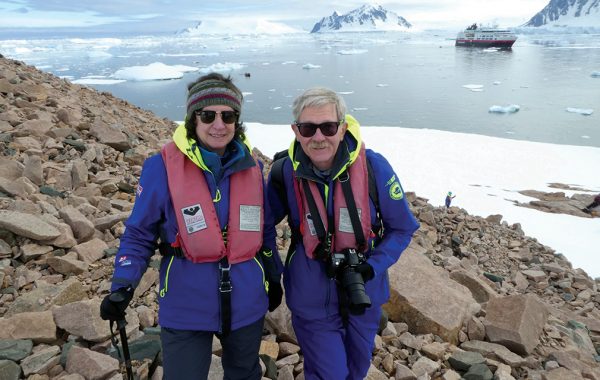
Linda Buchanan Allen ’77 and her husband, Boyd, just returned from a three-week voyage to the Antarctic Peninsula — 35 years after he went there for his master’s fieldwork in glaciology. She majored in English at Colgate and is now a freelance writer who covers topics ranging from travel and outdoor recreation to business and education.
Antarctica is the only continent entirely composed of wilderness with no permanent human settlements. Want to explore this vast continent of snow, ice, and mountains? Here’s what Allen says to expect:
Plan ahead… You’ll travel by ship with one of a few expedition-style tour operators during Antarctic summer, November through February. Most trips are booked a year or more in advance. Itineraries vary, but typically follow the peninsula. Your “hotel” is the boat, with daily landings for hiking, kayaking, and viewing wildlife up close. Some research stations also welcome visitors.
Your shipmates and crew are from all over the world… Guides deliver lectures and announcements in several languages. Dining is multicultural, too. Traveling aboard the MV Fram, operated by Norway’s Hurtigruten cruise line, we enjoyed plenty of seafood, hot soups, and even sampled roasted reindeer.
Embrace the outdoors… Temperatures range from 20° to 40°F, but sharp winds whip up without warning. The crew issued us parkas and boots, and we added our own wool and fleece layers.
Flexibility is key… As Antarctica’s sea ice fluctuates, so does the ship’s itinerary. Massive icebergs, smaller “growlers,” and flat pancake ice constantly shift, opening and closing a magnificent maze for navigators. Plans can change at a moment’s notice. When ice diverted us from one scheduled landing, we wound up farther below the Antarctic Circle than the Fram had ever ventured.
The environment is paramount… The International Association of Antarctica Tour Operators has developed strict protocols to preserve the pristine continent and its wildlife. We brought no food ashore, our boots and outer clothing were hosed and disinfected before and after each landing, and we took no artifacts or natural objects from the land or sea.
Adventure awaits… We hiked a volcano, sidled up to two sleeping humpbacks in our sea kayaks, waded through pungent penguin colonies on land, and spent hours on the ship’s deck spotting whales. Because the sun didn’t set until 9:30 p.m., one evening, we hiked a rocky moraine after dinner.
Have tips for people who might be maroon’d in your neck of the woods? Write us at scene@colgate.edu and put Maroon’d in the subject line.






